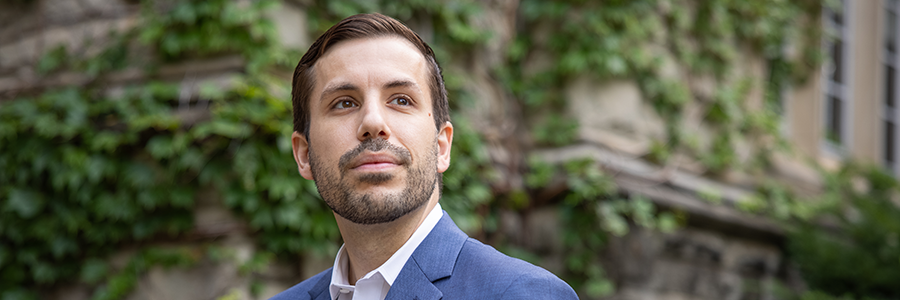10 Questions with Jeff Warnock
November 18, 2021

Jeff Warnock, JD’12, LLM’21, has returned to Western Law as a visiting professor and instructor for the Indigenous Law course. Jeff is a citizen of the Métis Nation of Ontario and previously worked as a litigator, the Senior Public Policy Advisor for the Métis Nation of Ontario, and on student programs and diversity outreach initiatives at Blake, Cassels & Graydon LLP.
1. What’s at the top of your bucket list?
Most of my bucket list items are travel-related. I would love to take a trip to the Galapagos Islands, New Zealand and Yosemite National Park, just to name a few. Also, in the past year I have been running more than I ever have in my life. I wouldn’t be so bold as to say that I’d like to run a marathon, but could I run a half marathon? That seems doable.2. What’s the best piece of advice you’ve ever received?
I heard comedian Jim Carrey say something in an interview that has always stuck with me: ‘You can fail at what you don’t want, so you might as well take a chance on doing what you love.’3. What do Canadians need to understand about reconciliation?
Volumes have been written about this subject, but I would answer this question with two suggestions:
First, recognize that everyone has a role to play in reconciliation. True reconciliation is only going to be achieved if everyone takes on the responsibility to do their part.
Second, listen to what Indigenous Peoples have to say on the subject. Indigenous Peoples have been highlighting what needs to be done to advance reconciliation for decades, from RCAP to the TRC calls-to-action. Listen to what Indigenous Peoples are saying and commit to meaningful and substantive changes in response.
4. Describe a challenge you’ve had to overcome.
Paying for my education was always a struggle. I relied on loans, some scholarships, and part-time jobs to cover the cost of my undergraduate and legal education. It was well worth it, but overcoming the financial barriers to higher education required a lot of work and planning.5. Who are your heroes and why?
I would have to say my partner, Sarah. She is a developmental pediatrician. I am in awe of her passion for her work and her dedication to helping children and their families.6. What was your last favourite book or Netflix binge?
I enjoyed reading Midnight in Chernobyl. It’s a very insightful account of the Chernobyl nuclear disaster. My most recent Netflix binge was Tim Robinson’s sketch series I Think You Should Leave. It has been on steady rotation for the past month or so.7. Why is a mandatory law class in Indigenous Law important?
I have an entire introductory lecture about this very subject, but I will try and keep it brief. Not only is a course addressing this subject a meaningful way for Western Law to work towards implementing TRC Call-to-Action #28, but it also helps to ensure that future generations of lawyers leave law school with an awareness of the revitalization of Indigenous legal traditions that are occurring in Canada. Legal education has traditionally focused on the common law and the civil law, while largely ignoring the laws of Indigenous Peoples. A course like this introduces students to topics that a legal education did not address until relatively recently.8. What’s your favourite Western Law memory?
The people — without a doubt. The professors were so critical to my education, and my classmates made my three years at Western such a fun and fulfilling experience. When I think about my law degree, the first thing I think about is the people.9. Where do you find inspiration?
My son Eli is a constant source of inspiration. His curiosity and sense of humour never cease to amaze me. I’ve also always felt inspired by spending time on Georgian Bay, where I grew up. I’ve travelled extensively for work and school, but a part of me will always consider it home.10. You have 60 seconds with a first-year law student. What do you tell them?
Three pieces of advice:
First, remember that this experience is about so much more than reading case law. Take advantage of the learning opportunities available to you outside the lecture hall and take the time to connect with your colleagues.
Second, try not to put too much pressure on yourself to figure out what the rest of your legal career is going to look like. Your professional path can take you in several different directions, so don’t feel like you have to get it all figured out right away.
Third, never forget why you applied to law school. Remember what it is about this profession that appeals to you. You need to care about the work you are doing, so while you are trying to navigate all the stresses and pressures of a legal education, periodically remind yourself what drew you to law school in the first place.
This story first appeared in the 2021 edition of the Western Law Alumni Magazine.






